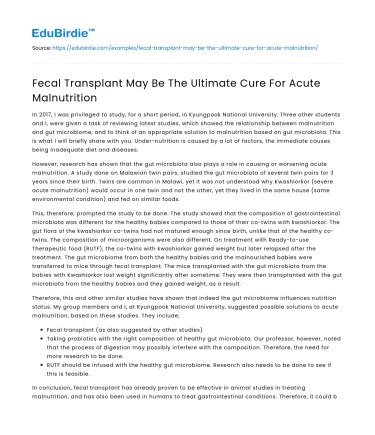In 2017, I was privileged to study, for a short period, in Kyungpook National University. Three other students and I, were given a task of reviewing latest studies, which showed the relationship between malnutrition and gut microbiome, and to think of an appropriate solution to malnutrition based on gut microbiota. This is what I will briefly share with you. Under-nutrition is caused by a lot of factors, the immediate causes being inadequate diet and diseases.
However, research has shown that the gut microbiota also plays a role in causing or worsening acute malnutrition. A study done on Malawian twin pairs, studied the gut microbiota of several twin pairs for 3 years since their birth. Twins are common in Malawi, yet it was not understood why Kwashiorkor (severe acute malnutrition) would occur in one twin and not the other, yet they lived in the same house (same environmental condition) and fed on similar foods.
Save your time!
We can take care of your essay
- Proper editing and formatting
- Free revision, title page, and bibliography
- Flexible prices and money-back guarantee
This, therefore, prompted the study to be done. The study showed that the composition of gastrointestinal microbiota was different for the healthy babies compared to those of their co-twins with kwashiorkor. The gut flora of the kwashiorkor co-twins had not matured enough since birth, unlike that of the healthy co-twins. The composition of microorganisms were also different. On treatment with Ready-to-use Therapeutic food (RUTF), the co-twins with kwashiorkor gained weight but later relapsed after the treatment. The gut microbiome from both the healthy babies and the malnourished babies were transferred to mice through fecal transplant. The mice transplanted with the gut microbiota from the babies with Kwashiorkor lost weight significantly after sometime. They were then transplanted with the gut microbiota from the healthy babies and they gained weight, as a result.
Therefore, this and other similar studies have shown that indeed the gut microbiome influences nutrition status. My group members and I, at Kyungpook National University, suggested possible solutions to acute malnutrition, based on these studies. They include;
- Fecal transplant (as also suggested by other studies)
- Taking probiotics with the right composition of healthy gut microbiota. Our professor, however, noted that the process of digestion may possibly interfere with the composition. Therefore, the need for more research to be done.
- RUTF should be infused with the healthy gut microbiome. Research also needs to be done to see if this is feasible.
In conclusion, fecal transplant has already proven to be effective in animal studies in treating malnutrition, and has also been used in humans to treat gastrointestinal conditions. Therefore, it could be a potential breakthrough in the management of acute malnutrition.






 Stuck on your essay?
Stuck on your essay?

